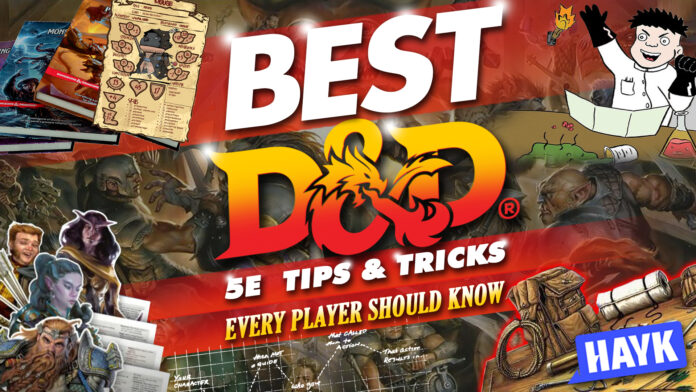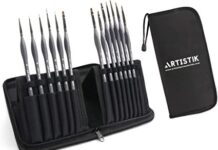
Hearing about a handful of 5E tips and tricks is easy, but pinpointing the very best tips is another matter. Many tips are subjective, coming from years of player experience and DM insights.
If you intend to become an awesome D&D player, you must use the best 5E tips as guidelines. You don’t have to look further – this article will discuss the most useful D&D 5E tips briefly. These tips cover numerous aspects like character creation, combat management, and even finding your adventuring group-for-keeps.
The Best D&D 5E Tips and Tricks For All Players
Character Creation

A Short Backstory is Better
The backstory is a great opportunity where you can flesh out your character’s origin, deep desires, hopes, ambition, and secrets. By writing a backstory, you’ll understand the character better while connecting to the grand plot of the campaign. Backstory writing is also an engaging creative exercise for writers and artists alike.
Some players, however, get carried away writing their characters’ backstories. They usually make backstories with more than fifteen pages, muddling the character concept with unnecessary personal lore and anecdotes. Terribly long backstories won’t help DMs at all.
A one-page backstory is advisable for all players. Try your best to craft the character’s backstory in less than five paragraphs. After all, an open-ended backstory will have more opportunities for growth or development.
Ability Scores Must Weave the Tale
Unlike what most players think, ability scores are not just power-measuring numbers. If you observe ability scores deeply, you’d realize that they can represent a character’s worldview. High-STR characters might think that weapons or tools are the lay of the land, while high-CHA characters will always settle for smooth-talking. The same manner applies to other ability scores.
You can use ability scores to shape your character’s backstory. This process is more reliable because you can analyze the numbers right away. If you start with the backstory, the generated ability scores might not reflect the final image of the character unless you’re using the Point Buy mechanic.
Always Have a Backup Character
Even though it is perfectly normal to invest in just one character, having a backup is never wrong. Throughout the campaign, your main character might suffer a tragic death and weaken your morale. Now, if you have a backup character, you can get back to the adventure almost immediately.
In making backup characters, you always have the option to connect your new character to the previous one. Perhaps both characters are siblings, and the new one is hungry for revenge. Try a new class build with your character. Maybe the DM will allow a cool idea or combo for the campaign.
Don’t Get Stuck with A Build
A character build is a mechanical template that dictates how a character can function under the right circumstances. Most builds are great for combat, but some options are also meant for roleplay and magic item farming. Following a build is normal, but it shouldn’t be a player’s sole reason for adventuring.
If you follow a build to a fault, you might end up disappointed halfway through the campaign. Many situations can mess up with your build, and the DM can change conditions mid-session. Other party players might get disappointed that you’re just focused on the build instead of the story.
Adaptation is an important quality that you should have if you’re following a mechanical character build. Whenever something happens in the campaign, you must be ready to forget the build and operate on basic features unlocked by your level.
Get the Helpful Starting Items
D&D is filled with countless items that can overwhelm many beginners. From the Player’s Handbook alone, players can find dozens of items with different uses. It’s a good thing that the PHB has included starting items with every character class.
Before delving in any D&D adventure, always prioritize these items:
- Rope
- Torches and lanterns
- Rations
- Wagons
- Class-based kits (i.e. explorer’s kit)
- Thieves’ tools
- Crowbar
- Quill
- Extra parchments
- Beasts of burden
- Flask
Adventuring items are not just for décor or roleplaying purposes. They can be used to negotiate with the DM, especially if you want to gain bonuses for a skill check (i.e. crowbar for breaking a door lock).
Roleplaying and Etiquette

Be Generous With the Spotlight
Every D&D table has a metaphorical spotlight. This spotlight pertains to the chance where players can start RPing and acting out their characters. In a formal social encounter, this simply means that the player is taking his turn to speak.
Once your character takes the spotlight, you need to be generous and considerate. Don’t consume too much time while roleplaying. A few minutes of improvisation is enough unless the DM wants to extend the social encounter.
If someone is roleplaying, always listen with keen interest. The player will appreciate your effort, and he or she might do the same. Keep in mind that effective roleplaying is a matter of ‘give-and-take’ in the table.
Always RP With the Character’s Perspective
Roleplaying draws the fragile line between reality and fantasy. At one end of the coin, you have to act based on your character’s personality and motivations. Then at the other side, you must ignore a relevant piece of game information because your character is not aware of it. Since D&D is governed by improvisation, you should always follow the character’s immediate perspective.
How should your character act at the present moment? This is the question that you must answer in every D&D situation. It’s okay to feel your character’s emotions, even if you have to shed tears or blow up in anger. Emotion-packed moments are actually the triumph of great DMs and players.
Listen Intently to the DM
In any D&D session, it’s always important to listen to the DM. The DM usually narrates everything that’s happening in a given scenario. If you’re not actively listening, you might miss some essential details related to the current quest or mission. This can lead to embarrassing situations, especially if you keep on asking the DM to repeat himself.
Turn off your phone once the session has begun. Or at the very least, try to limit the phone’s app notifications and reminders. You don’t need a smartphone during a session unless you only have digital tools as of the moment.
Be A Simulationist in the Session
Simulationism is an old concept from tabletop RPGs. Basically, simulationism is about achieving total immersion in an artificial setting. If you play like a simulationist, you’d feel more immersed or invested in almost every scene. It’s like you’re actually part of the DM’s campaign world.
To become a simulationist, you must understand your character from the inside out. Do your best to connect the character to the greater world – just like a surveyor scanning for dangers and interesting areas.
Any Reasonable Style is Valid
Every D&D player has a unique playing style. Some players love to initiate combat at every possible turn, while others prefer rigorous detail-taking or roleplaying. Once you’ve joined a table, you must understand that all playing styles are valid. No one should question your style unless it affects the party in a negative way.
Also, you don’t have to copy the style of players from popular shows and podcasts. Live play players are often actors and paid enough to give their very best. Just be yourself and you’d enjoy playing D&D even more!
Props Are Nice
Using props in a D&D session will make the adventure more authentic. The props will even help players in narrating their actions or explaining their intent. Some popular props are potion bottles, cardboard weapons, Styrofoam relics, and custom-made plushies.
Ordering D&D props online is a time-saver. Not only will you get the products within a few days, but you can also choose from many affordable choices.
Surviving Combat

Combat Awareness is Important
One skill that can help you improve as a D&D player is combat awareness. As you probably know, combat can be a tricky thing. Everyone is busy planning their next actions, and some are even concerned of scoring the most kills. By improving your combat awareness, you can spot important details and utilize some terrain advantages.
You can’t improve combat awareness overnight. It takes multiple encounters before you get to master the skill, but there are also numerous factors involved. One factor is the DM’s leniency in the encounter. If the DM allows unique combat action ideas, then you should always explore the environment. Ask questions about structural weaknesses that your party can exploit. Or better yet, try asking for emergency exits even if you have to roll a Perception check for it!
Knowing the full capabilities of your comrades is also part of improving combat awareness. To maximize combat effectiveness, you must time your actions with a class that nullifies your character’s weak points. You might also consider not getting far from the range of the party healer.
Mind Your Modifiers
Modifiers are important numbers that can increase the success rate of skill checks and rolls. Despite the importance of modifiers, many players forget about them during the heat of battle. As a result, the DM needs to double-check and remind players of their character modifiers. This can lead to combat slowdown and wasted time.
These are the modifiers to watch out for in combat:
- Attack modifiers
- Spell attack modifiers
- Item bonuses
- Ability score modifiers
Highlighting the modifiers in your character sheet is a useful time-saving method. Once the modifiers are highlighted, you can scan them easily and proceed with your rolls
Reduce Opponents’ Action Economy
Action economy is the honeypot of all combat encounters. By focusing on action economy, you can improve as a player and develop key strategies for winning combats. For starters, action economy pertains to the actions that players or monsters can take during an encounter. If a badass boss is facing six adventurers alone, he is destined to die after approximately ten turns or less. Over time, the numbers will change but the premise of the action economy remains.
Whenever the opportunity presents itself, you must do your best to reduce an opponent’s action economy. The simple ways to reduce action economy are entrapment spells, grapple, shoving, minion banishment, and movement restriction. In long, drawn-out battles, it’s almost always wise to destroy an enemy than spend an action for healing.
Watch out for battlefield summoners. These casters are capable of filling the battlefield with tons of monsters within a few turns. If a summoner is present, encourage your friends to target it with ranged attacks or weaken its defense through Hunter’s Mark.
Always Support the Tanks
The tanks are heroes of the frontlines. They soak up continuous damage while dealing with many enemies at the same time. The best tanky classes are Barbarians, Fighters, Paladins, and well-buffed Clerics.
As a responsible player, you must keep an eye out for the party’s tanks. Always support the tanks by softening enemies with ranged attacks or throwing healing spells. If possible, you should summon extra monsters that can bolster the frontlines.
Focus on Your Strengths
There’s almost no point in amplifying your character’s weakness in D&D – unless you want to achieve something that will benefit the party. Character strengths make combat encounters remarkable, while character weaknesses are often reserved for roleplaying.
Adhere to your character’s strengths whenever you have the chance. If you’re a Fighter proficient with all piercing weapons, then use piercing weapons by all means! The same notion applies to other classes specializing on spells, exploration, crafting, thieving, and ambushing.
By understanding your character’s strengths, you can also make a decent levelling plan. You’d know the class features to prioritize, and you can get the best feats to make your character stronger than ever.
Make Your Spellbook Flexible
Spells make the realms of D&D extra special. Through powerful spells, any player can achieve awesome things such as extraplanar summoning, replication, resurrection, and even alteration of fate. Due to the power scaling of spells, caster classes are often in-demand.
Before you march into combat as a spellcaster, you must ensure that your spellbook is well-balanced to meet the risks of an encounter. Fill your spellbook with damaging spells if you feel that the party has a low damage output. Otherwise, try to learn spells that can mess up the enemies’ action economy. Escape spells (i.e. teleport, dimension door) are also great alternatives that will increase the survivability of your party.
Finding A Group

Start Searching in RPG Forums
RPG forums are self-contained communities populated by enthusiastic tabletop players. In these forums, you can find system discussions, sourcebook reviews, class guides, and active recruitment boards. Joining an RPG forum is a wise choice because of limited distractions and the chance to delve into the hobby further.
Here are some active forums that you can always visit:
- RPG.net
- Enworld
- D&D Beyond
Don’t forget to make friends in an RPG forum! By having lots of tabletop enthusiast friends, you’d always get the opportunity to join one-shot adventures or even big campaigns.
Create a Player Resume
Many players struggle to find D&D tables because of the rapidly changing preferences of DMs. Some DMs want serious simulation-hungry players, while others prefer fresh 5E beginners. DMs also interview players, leading to a bottleneck in the recruitment process.
You can speed up the process by preparing a ‘player resume.’ This document represents your experience in D&D 5E, covering important aspects like strengths and weaknesses. You should also include your campaign preferences and expectations. With every online application, you can attach a link to your player resume, allowing the DM to browse it quickly.
Join an Online West Marches Group
Finding a D&D playgroup has become easier with the help of the Internet. You can scour social media and find a group by inputting specific keywords. If you want faster results, try to look for a D&D group with a West Marches style.
A West Marches-inspired group is a big sandbox community. Any player can hop in the group for a quick adventure or one-shot. Long-term campaigns are few and far between. West Marches groups also have active lounges where players can talk to each other and discuss character builds. Downtime activities are also more prevalent in a West Marches group because of players’ varying schedules.
Visit Your Local Game Store
Now that most hobby shops have resumed their operations, physical D&D sessions are back on track. One of the fastest ways to get to a physical D&D session is to visit the local hobby store. Ask the owner if they have a sponsored playgroup or an upcoming tabletop RPG event. There’s also a fair chance that the game store has a regular schedule for D&D Adventurer’s League.
If the store doesn’t have a playgroup, then you should invite your friends over and negotiate with the owner. Your all-friend party might become the store’s representative D&D group!
Best D&D Products to Help You Enjoy the Game
Laeral Silverhand’s Explorer’s Kit
Pros:
- Affordable
- Helps players understand common D&D lore
- Cool-looking dice
Cons:
- Dice is too light
- Some map areas are not covered
Laeral Silverhand is one of the most powerful arcane spellcasters in all of Faerun. Her influence is also unbeatable, especially now that she’s currently the Open Lord of Waterdeep. Given Laeral’s popularity, it’d be a great opportunity to own a product under her name. One product that true D&D enthusiasts shouldn’t miss is Laeral Silverhand’s Explorer’s Kit.
Laeral Silverhand’s Explorer’s Kit contains eleven neon-blue dice pieces. Aside from the dice, you also get illustrated cards that contain special lore about Waterdeep and its prominent denizens. The inner box is also fancy and sturdy enough to function as a convenient dice tray.
Lastly, the Silverhand kit has a foldable map that shows the detailed area of Sword Coast and Waterdeep. Still, some areas of the popular locations aren’t covered. You may need to improvise the uncovered map sections.
Trunab Tabletop RPG Adventurer’s Bag
Pros:
- Big enough to fit more than five D&D books
- Extra pockets for accessories
- Comes with a sturdy case for minis
Cons:
- Blocky and bulky appearance
There are many ways to measure a player’s dedication to tabletop RPG. Some factors include the number of dice sets owned by the player, while others are related to official sourcebooks and third-party materials. But if you really want to push your D&D experience to the roof, you need a truly reliable product that can support the hobby for many years. One such product is Trunab’s Adventurer Carrying Bag.
The Trunab adventurer’s bag is spacious enough to accommodate up to 8 big books. With this capacity, you can bring all official sourcebooks wherever you want. Inside the bag, you’d find dividers that separate each book conveniently. No more unnecessary shuffling and digging to get the book you need!
Other useful parts of the bag include a miniature carry case, a rolling protective map case, and four big pockets. You can put extra index cards and D&D accessories inside these foam-padded pockets, protecting them while you’re on the go.
Even if you’re not playing D&D as of the moment, you can still use the Trunab bag for other purposes like vacation storage or a makeup kit. The only minor issue of the bag is its bulky appearance. Carrying the Trunab bag will give off the impression that you’re a really busy person!
Forged Dice Co. Serpent Dice Jail
Pros:
- Aesthetic, grim-looking dice jail
- Has a stone serpent on top
Cons:
- Dice jail is small
Sometimes, no matter how well you narrate your action and intention in D&D, things won’t go your way. The most significant factor that affects your success and failure in D&D is the dice roll. Ever since the hobby catapulted from Gary Gygax’s basement, countless beautiful plans have already been foiled by bad dice rolls.
If a dice failed you recently, don’t throw it away – just lock it inside the Forged Dice Co. Serpent Dice Jail. This aesthetic dice jail represents the punishment deserved by misbehaving pieces of dice. On top of the dice jail is a stone serpent that guards the entire die inside.
There are almost no major problems with the Serpent dice jail. Perhaps the only minor issue is its minuscule size. Other dice jails are big and flashy, but they also cost more.
D&D 5E Tips and Tricks – FAQ
How can I make my character strong?
Answer: There are many ways to increase a character’s power. Levelling up is the most common method but definitely one of the longest. The next method is questing. By taking an important side-quest, your character can find a strong magic item or learn a new feat. The effectiveness of side-questing depends on your DM’s creativity and leniency.
Why are magic items so expensive or hard to find?
Answer: Magic items have the potential to derail a campaign or make characters exceedingly powerful. The associated risks and costs should always be greater than the magic item’s intended effect. At the end of the day, magic item availability depends on the DM.
What are the best spells that every party must have?
Answer: The answer depends on the composition and the current goals of the party. Healing Word is a nice choice if the party has a cleric. Other useful spells are Mage Hand, Goodberry, Featherfall, Prestidigitation, Hold Person, Leomund’s Tiny Hut, and the game-changing Wish.
Do mounts make a character OP?
Answer: Cosmetic mounts won’t make a character overpowered. However, any observant DM should check the mounts used for battle. Mounts can increase a character’s movement speed, allowing better positioning. Some high-level mounts can even fly and make separate attacks within a turn!
Is multiclassing advisable?
Answer: Multiclassing is a great way to unlock the full potential of a character, but it’s a bit confusing for beginners. With multiple classes, you might have a hard time tracking separate details and extra class features. But through practice, you will soon get the hang of efficient multiclassing.
Final Reminders
Now that you’re aware of some useful D&D 5E tips and tricks, it’s time to go out there and find a playgroup. Don’t settle for the first group that you can find, unless it really matches your preferences. And always remember that all 5E tips are not permanent – they’re meant to change over time as the hobby moves in a better direction.
Have you found extra tips that we haven’t covered? Share them in the comments section! We’d love to hear your thoughts.





